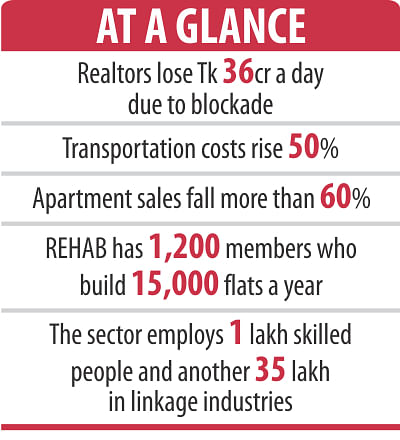Realtors' woes compounded by blockade

The real estate sector has incurred losses of around Tk 792 crore over the last 22 days due to the non-stop blockade, which has knocked the sector's supply chain.
“Our sector is passing through a very difficult time as we are unable to bring in raw materials,” said Liakat Ali Bhuiyan, vice-president of the Real Estate and Housing Association of Bangladesh.
As a result, most realtors are keeping construction work on hold. “Yet, the workers wages have to be paid regardless of work being done or not.”
On average, the daily overhead cost of a real estate company is around Tk 3 lakh, meaning the blockade is causing losses of Tk 36 crore to REHAB's 1,200 members a day.
The recent political violence has emerged as the latest setback to the real estate sector, said Toufiq M Seraj, managing director of Sheltech, which has around 25 ongoing projects in Dhaka.
“We have to stop or slow our construction work due to insufficient materials,” he said, adding that his company procures construction materials such as rod, cement and stone from various parts of the country.
But the non-stop blockade has disrupted the supply chain, said Seraj, also a former president of REHAB.
Construction is a very complex sector as its workflow depends on the smooth supply of materials, said Tanveerul Haque Probal, managing director of Building For Future Ltd.
Blockades and strikes affect mostly the projects that are at their final stages, as most of the artisans who add the finishing touches live outside of Dhaka and cannot travel to and from the worksite, he added.
Even if they manage to get deliveries of their raw materials, they have to pay higher transport fares.
Of late, the carrying cost has increased by more than 50 percent, said Bhuiyan, also the chairman of Brick Works Development Ltd.
For instance, a real estate company paid up to Tk 5,000 to hire a truck to bring in bricks from the outskirts of Dhaka like Gazipur's Konabari, Narayanganj's Pagla and Manikganj. The same now cost Tk 8,000-10,000, he said.
Realtors said such higher overhead costs will obviously increase the price of apartments, which are already experiencing a slump in sales in the last couple of years.
The sector's sales fell as much as 60 percent in 2013 and the situation is not any better now, according to REHAB.
The slump can mainly be attributed to buyers' lack of access to low-cost home loans and abnormal rise in apartment prices between 2011 and 2012, industry people said.
The number of new projects undertaken by developers has declined by around 75 percent from the previous year in 2013, according to the association.
Currently, REHAB has around 1,200 members that build, on average, 15,000 units of apartments annually.
The real estate sector now contributes around 7 percent to the country's gross domestic product, while employing around one lakh skilled people and another 35 lakh in linkage industries, according to industry people.

 For all latest news, follow The Daily Star's Google News channel.
For all latest news, follow The Daily Star's Google News channel. 




Comments